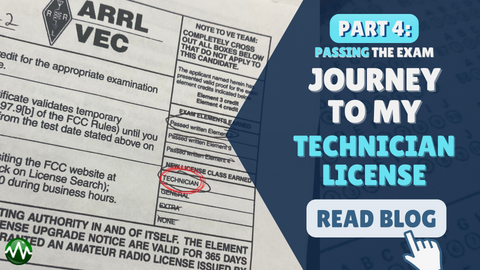
Journey To My Tech License Part 4: Passing the Exam

Before I keep you in suspense for too long about how the test went, I want to let you know that all four members of our team that took the test, passed!
Although it was just our first step into amateur radio, this should give you all the confidence in the world that anyone can, even those of us who are completely new to this world. And while you may have already aced your exams long ago, this blog post can be used as a guide to usher in a newer generation of hams and amateur radio enthusiasts that can use our story as motivation so anyone thinking about getting their technician license can head into the exam room confidently, and ready to ace the exam. In today' blog, I'll go through exam day story, and throw in some tips and things I learned so you can make your testing day a total success.
Our test was set to be taken anywhere from 10am-12pm on Saturday, May 14th... or so we thought.
It turns out, the exam was set to start at around 10am, and would be finished when the last person in the room had completed their test, which brings me to my first point..
1. Communicate Clearly with Your Exam Session Coordinator
We took our exam in person, which means we had to drive to a separate location to take the test. Because we were under the impression the test could be taken anytime between 10am and 12pm, we thought we were in the clear to show up anytime to complete the exam between those hours. However, when we showed up, the test had already been administered to the first group of test takers. Luckily, some were still finishing theirs up so we were still able to take the test after planning for this day for a month in advance.
One little mistake like this could have slowed our momentum and halted our entrance into the world of amateur radio, so make certain that you know exactly when to show up for the test. If it weren't for our Volunteer Examiners that stayed a bit later to proctor our test, we may have had to wait until mid-June to complete it.
Remember that you are also able to take your exam online as well. You will need to let your exam coordinator know beforehand if you would like to take the test virtually. In that case, you would need a Laptop, Smart Phone, a Printer, and a Scanner. Our instructions for a virtual setup says to get in contact with our exam coordinator to advise the setup, so if this is the route you wish to go, make sure you keep the line of communication open, so mishaps and mistakes can be eliminated for the day of your exam.
--
I woke up on the day of the test feeling better about the material after cramming and making sure I was really comfortable with the study guides and practice tests throughout the week. One thing I didn't focus on as much was what I actually needed to take to the exam which bring me to my next tip..
2. Make Sure You Have Everything You Need for Your Test Day
Ensure you know the location and city where you will be taking your exam. The night before, I did do a good job to look up the location on GPS and mapped out my route so I knew how long it was going to take to get there. I knew it was going to take about 30 minutes to get to the location, and took some advice my dad gave me "Give yourself time to get lost beforehand". I followed that advice and gave myself a few extra moments to get ready.
It's a good thing I did because the materials I needed weren't quite ready to go in the morning. Ensure the following list of materials for your exam are ready to go.
Materials you will need:
- $15 Cash for an in-person exam -or- Send $15 Virtually for an online exam
- Your Photo ID
- A Copy of your Ham License (if you have one)
-
Your 605-1 Form (including your FRN number)
-You can obtain your FRN number with this link if you do not have one yet: https://www.fcc.gov/wireless/support/universal-licensing-system-uls-resources/getting-fcc-registration-number-frn
-The 605 Form can be found here if you still need yours:
http://www.arrl.org/fcc-forms
- A CSCE (Certificate of Successful Completion of Examination) form (Your exam coordinator should provide this)
- Answer Sheet form (Your exam coordinator should provide this)
Your exam coordinator should provide an email and phone number to get in contact with, so make sure you have that information on hand in case you have any questions leading up to the test. In our case, you can take as many tests as your can pass, so if want to get your Technician, General, and Extra in one swoop, you are able do do so, just remember the amount of studying that will be required. Bottom line here, make sure you are ready to go, have all the forms that you will need printed and filled out, and be as prepared as possible for the big day.
3. Taking the Actual Exam
So at this point, you know when test day is, you have your materials for the test ready to go, and now it's time to take you test.
Give your forms and your ID to the Volunteer Examiner (VE) at your test taking station, or if you are taking it online, make sure you have sent the forms over via scanner or another way, following the directions of your exam coordinator. There will likely be several VEs at your exam, and I would guess there was about 5-6 at our exam location.
They will take you to a seat away from the rest of the test takers and after they have verified your forms and identification, you will be left with your answer sheet, and the test booklet provided by a VE.
Although I can't recall all the questions on the test, I can assure you that these questions are exactly the same questions you have been studying for the last month. As long as you use the resources listed in our 'Technician License Study Resources' Blog Article, you will know you are studying the same material that will be on your exam. By this point, you should be hitting around 80% on your practice tests. If you are around this range consistently, you know you are on your way to receiving your tech license.
4. Completing the Exam
Time will not be much of a factor as you are going through the questions, as two hours will be ample time to complete the 35-question exam. One suggestion I would have at this point? Check your work. There were a few questions I was unsure on so I skipped over those and then came back to them. After rereading a few of them, I changed my answers because I may not have read them clearly in the first place.
Now, I'm not telling you to second guess yourself or change your answers, but I am telling you to carefully read everything, as many of the questions and answers can be similar, but there is only one right answer to each question asked.
After you've double-checked everything let the VE know you have completed your test. They will then grade it, double check it with the other VE's present, and then they will let you know how you did. If you passed, your CSCE form should look like the below image, completed with your own information as well as which exam you passed, as well as the new license class you have earned.
If you've made it to this stage and have your CSCE on hand, completed by one of your VEs, I want to be the first newly licensed Ham to say.. Congratulations!!
Your hard work has paid off and you are on your way to getting assigned a Callsign. Just remember that you are not yet licensed even if you have passed the test, there are a just a couple more things we need to do to get you on the air.
5. Obtaining Your Callsign
There is one basic step left in this process and this step may be the most important. The final step here is actually obtaining your callsign. At this point, this is also when $35 to the FCC is due
Our VEs all told us "You have 10 days after passing the exam to apply for for Callsign."
DO NOT FORGET THIS STEP.
You will be emailed by the FCC likely within 2-3 days of passing your test. For example, I passed my test on Saturday, the 14th, and received my email from the FCC on the 17th. The email you receive will have the subject line:
'Payment Required for the FCC License Applications submitted on your behalf by ARRL/VEC'.
It will look exactly like this, but with your information present:
Click the blue link in the middle that follows the sentence, "Login to Pay Fees using your Username and password and follow the on-screen prompts".
This will direct you to the FCC login page where you have the option to login to CORES - the FCC's updated Commission Registration System, using your FCC username or FRN. I used my FRN to get logged in as I had that handy.
Once you are logged in to cores, head to the CORES payment systems:
https://www.fcc.gov/licensing-databases/fees/cores-payment-system
This will take you to the login system page:
https://apps.fcc.gov/cores/paymentFrnLogin.do
After you've logged in with your information, you should be taken to a page that looks like this:
I have already completed my payment in this situation, but if you have not completed your payment as of yet, you will click on 'Application Fee' and will complete the payment just as you would on any other website.
Once you've completed your payment, and have confirmed it's complete, now all you have to do is wait for the confirmation email. The subject line will say 'FCC Application Grant OR Official FCC License' and the email will look like this:
When you get this email click the 'Authorization link' in the middle of the email. This link will lead you to the authorizations page where you will be presented with a License Manager Page. As long as you've completed and passed the test and followed the above steps, you should see your call sign on this page.
Sometimes this part is a little tricky. I was running into a few 'Expired Session' notices for unknown reasons while trying to complete this step. If you need help during this part feel free to give them a call at 877-480-3201 or submit a help request https://www.fcc.gov/wireless/available-support-services.
--
Hopefully our first steps into amateur radio can provide some insight into the preparation and actions needed to obtain your amateur radio license. This journey has been a wild one, full of mistakes and new information, but I have learned so much from it and have really enjoyed diving deeper into the amateur radio industry. It's opened my eyes to a world I wasn't well aware of years ago, and has helped me to see the true value that hams and ham radio provides to so many industries and people throughout the world.
Follow along our 4 part series to get a step-by-step breakdown of what you need to do to to obtain your ham radio technician license, and you will be calling yourself a newly licensed ham within a month.
Check out the other 4 part series to our 'Journey to My Technician License' series below.
Journey to My Technician License: Part 1
Journey to My Technician License Part 2: Studying Tips
Journey to My Technician License Part 3: The Week of the Test
The Best Radio to Get You Started?
The 878UVII Plus is great for beginners, as well as Experienced Hams.
Check it out here!






